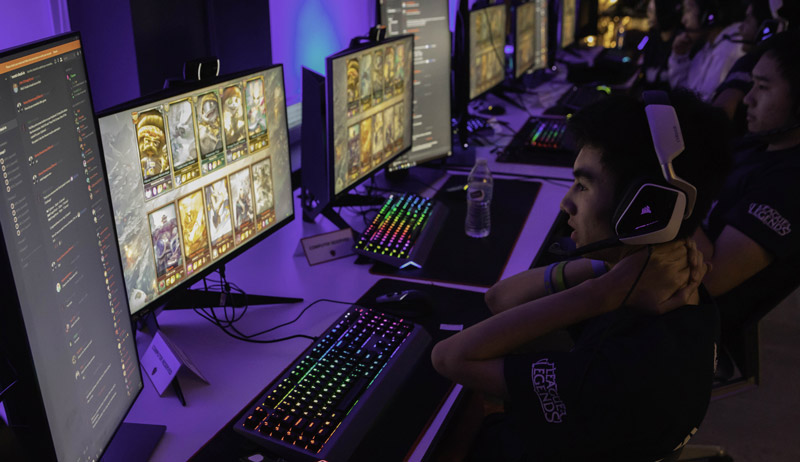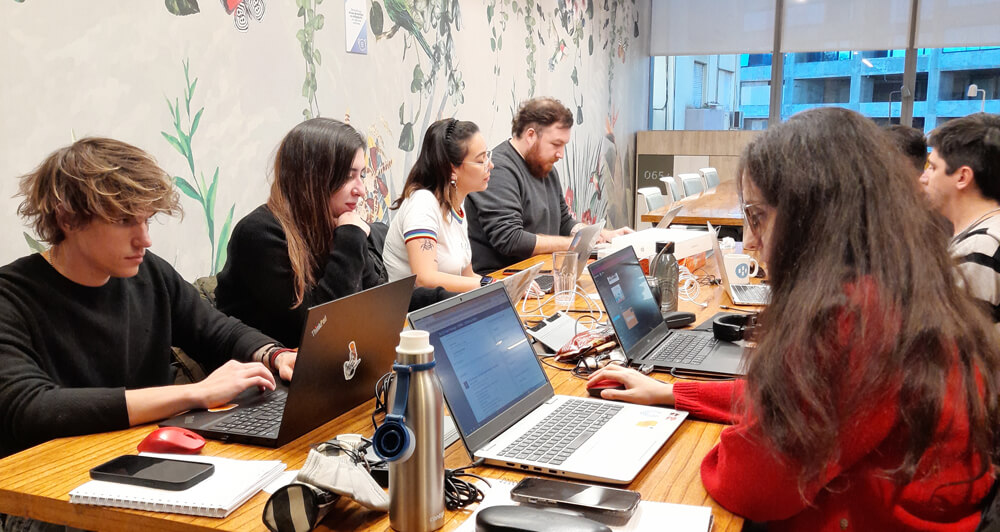Differences between an IT recruiter and a gaming recruiter:
In the IT world, every profile has a role in every project. Team members usually are backend and frontend developers, Team & Tech Leads, Project Managers, Project Owners, QA’s, and Scrum Masters.
The gaming industry is similar to any tech team, and each person has a role in creating a game. Still, it has subtle differences, so it will be necessary to re-learn all these roles to better understand the game creation process and find the exact profiles each client needs.
What does it take to be a successful recruiter in the gaming industry?
As recruiters, we will make a difference and know better if we are gamers. This way, we can genuinely connect with candidates and explore their experience and motivation, gaining the information you need to make the final hiring decision. The more we connect with the industry, the more it will help our company find the best match. As a result, it will accelerate game development efficiently and deliver a great product that will play a key role in our success and growth, both as a company and as a gaming recruitment team.
It is necessary to have Industry insights. Video games, or the gaming universe, is a highly dynamic and fast-growing industry. There’s never a quiet day of video games, and there will always be developments. Becoming involved with the gaming community will make us aware of all relevant news, views, and contenders, which can boost our suitability for the role.
Which tools do we use to recruit?
In the IT Recruitment sector, we use Linkedin, GitHub, and StackOverflow, but in the gaming sector, besides using those same sites, depending on the job description and roles, some platforms may vary: If we are looking for artists, we will probably use Artstation, Behance, Dribbble, DeviantArt, CGSociety.
In addition, we have Slack, Discord, Slack, Meetup.com, and Twitter; all these social media are intimately related to gaming & blockchain, so it’s an option for us to network there as well.
What are the typical profiles of the gaming industry?
It is worth clarifying that this is a general approach; within each profile, there are different particularities and even more specific roles.
Game programmer
These are developers responsible for developing an engine or adapting it to the specific needs of users. The most commonly used engines today are Unreal Engine 4-5 and Unity Engine, and most of them need knowledge of C++ and C#.
Recommended Questions: Did you code a game from scratch? Do you have ongoing games to show? Have you ever done code reviews? Did you have the chance to mentor someone?
Game designers
To make a game playable, enjoyable, and engaging, game designers concentrate on its functionality by developing its mechanisms, rules, and gameplay. They also assist with world-building (lore and maps). They are responsible for the overall user experience as well as the design and implementation of the game mechanics. When hiring in the game industry and looking for gameplay designers, always do previous research on games they have worked on. Also, do more research to see what they bring to the project. Interview questions should focus on what features the candidate would implement, what they would remove or add, etc.
Recommended Questions: How do you think you can make this game more interesting? What teams did you have to interact with? What are your priorities in order to develop a really fun game from scratch?
Conceptual artists
They draw different locations, characters, and objects that will be sent to the animators and modelers. The main thing recruiters should look for is their portfolio. It is always good to ask about working with story writers and gameplay designers. Focus on collaboration and soft skills.
Recommended Questions: What type of art do you prefer? Did you have to work with different styles simultaneously? Did you work in teams? In that case, how did you asign tasks?

Story writers
Every game needs a good story. Read some of the stories and templates available online or submitted by candidates. They are usually responsible for writing the quests, the game lore, and the characters’ stories. You should search and ask through the candidates’ stories and look for two essential things: How many of these stories are written from scratch, and how many are adaptations of famous works or tales being applied to the game?
Recommended Questions: Where do you find inspiration for your stories? Who do you talk with to have insights of your work? Do you relate with any of your characters?
User interface/User experience designers (UX/UI)
UI designers are responsible for developing game interfaces and menus. The main focus of every game is to have a clear user interface and an optimal user experience.
Recommended Questions: While interviewing, it is essential to ask about how the candidate did their research in previous experiences, if they had to face modifications of their work, and why.
QA analysts or game testers
Quality control in game development is essential so that on launch day, there are no significant bugs or downtime that can affect your game’s final score and the users’ impression. Just as in IT, there are manuals and automation.
When hiring QA testers, it is essential to see their experience in testing applications, especially games.
Recommended Questions: Do you recall any significant bugs that you have identified? What types of testing did you do?
The importance of getting the right recruitment agency
A gaming industry recruiting agency will make the difference.
It is necessary to have specific characteristics which require prior study and review, making it essential to find a recruiter immersed in the gaming industry to match the skills, experience, and features each company will need.
From a recruiter’s point of view, it will be crucial to have a brand and a good networking capacity because that’s how recruiters find suitable candidates in the gaming industry. An excellent way to network would be to visit different workshops, participate as a guest or speaker, connect with people, ask them if they are interested in working on a new project, etc. Game Jams and Hackathons are an excellent way to attract potential talent.




